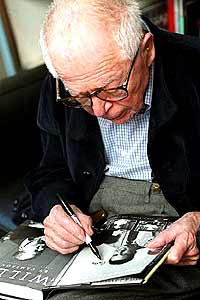Quotable Wilder
Billy Wilder’s Wit and Wisdom
On Marilyn Monroe: “She was very tough to work with. But what you had, by hook or crook, once you saw it on the screen, it was just amazing. Amazing, the radiation that came out. And she was, believe it or not, an excellent dialogue actress.”
____
On Barbara Stanwyck: “With Stanwyck, I had absolutely no difficulties at all. And she knew the script, everybody’s lines. You could wake her up in the middle of the night and she’d know the scene. Never a fault, never a mistake — just a wonderful brain she had.”
____
On Audrey Hepburn: “That’s the element X that people have, or don’t have. You can meet somebody and you can be enchanted, and then you photograph them and it’s nothing. But she had it. And there will not be another. She exists forever, in her time. … She started something new, she started something classy. She, and the other Hepburn, Katharine, at a different time.”
____
“I never overestimate the audience, nor do I underestimate them. I just have a very rational idea as to who we’re dealing with, and that we’re not making a picture for Harvard Law School, we’re making a picture for middle-class people, the people that you see on the subway, or the people that you see in a restaurant. Just normal people.”
____
“I just always think, `Do I like it?’ And if I like it, maybe other people will come and like it too.”
____
“I, you know, am all over the place — every category of pictures I have made, good, bad or indifferent. I could not make, like Hitchcock did, one Hitchcock picture after another. … I wanted to do a Hitchcock picture, so I did `Witness for the Prosecution,’ then I was bored with it, so I moved on.”
____
On making “Some Like It Hot” in black and white: “I liked it in black and white. I was then one of the last guys still doing it. But when I run into people — you know, as a test — they say, `I saw “Some Like It Hot,” it was wonderful, wonderful,’ and I say, `How did you like the color photography?’ They say, `It was great, it was absolutely great.’ People forget, they don’t remember. It’s less important than the content of the picture, you know. After five minutes they forget about it.”
____
On the death of his mother in the Holocaust. “I don’t know anything about how she ended up in the camp. I just know that it was Auschwitz because everybody from Vienna, where she lived, went there. I did not know that they had concentration camps. You know, it was kept quiet. Roosevelt did not tell us about it.”
Copyright © 1999 Conversations With Wilder – by Cameron Crowe. All rights reserved.


